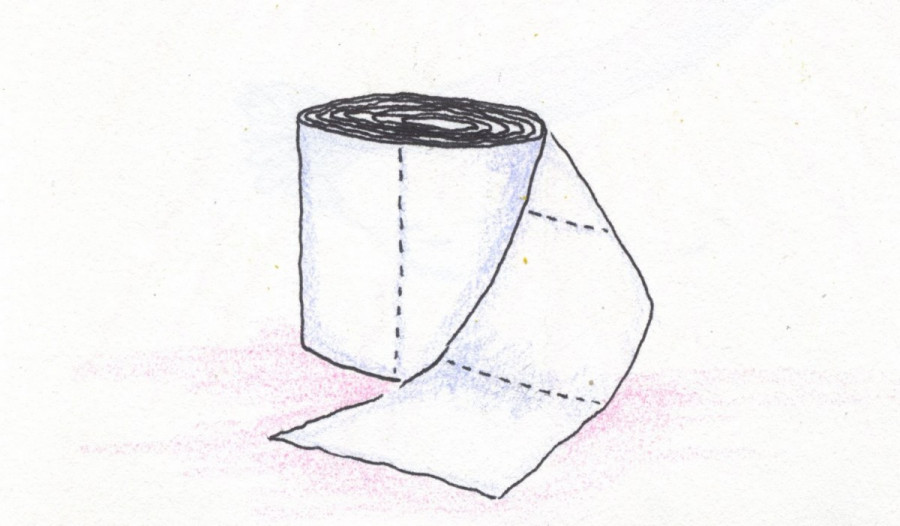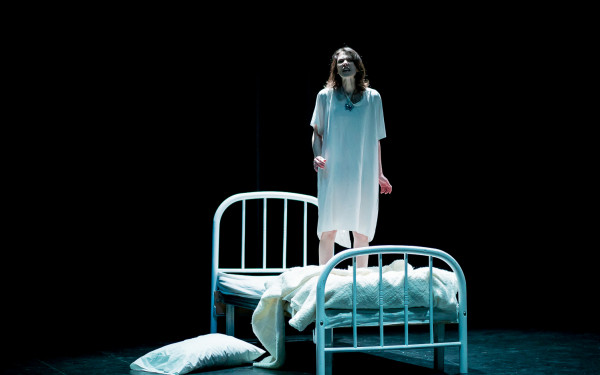Toilet Paper Borders
University of the Streets Café Explores Border and Immigration Issues Through Theatre
Who and what define where people have the right to live? Can we create a world that is more accepting of people from other places who may have differently coloured skin and speak with different words?
These are some of the questions immigrant artist Lynne Cooper set out to explore when she premiered Sunk in the Trunk in 2006 at Montreal Arts Interculturels.
The show, and the question of borders, was revisited last Wednesday evening during the first event of the Concordia-run conversation series, “University of the Streets Café,” held at the MAI on the tenth anniversary of the show’s premiere.
Billed as “a clown’s wonderful struggle with immigration,” the two-person show was developed by Cooper in collaboration with fellow Montreal actor and clown, Francis Neron.
The project served as a creative outlet for her own difficult experience of immigrating to Canada and gaining permanent resident status in Quebec.
Born in Honduras to a Trinidadian mother and Chilean father, with British grandparents, Cooper got into theatre as a teenager, touring the world with a production of Alice in Wonderland and then pursuing studies in clowning. In 2000, she decided to move to Canada with the dream of joining Cirque du Soleil.
Unfortunately, she was not accepted into the company, but fell in love with Montreal and decided to stay and seek residency. And that’s when the trouble—and the creative inspiration—began.
After several years of applications and waiting, and numerous trips to the border to renew her traveler’s visa, she was eventually rejected by Canadian immigration officials and spent the next year out of the country, trying to get back in. Finally, she did—with papers—and set about creating Sunk in the Trunk using little more than toilet paper, a plunger, and a big blue traveler’s trunk.
Perhaps a testament to the resourcefulness of immigrants who often arrive with little more than the clothes on their backs, the toilet paper is used creatively throughout the show to suggest borders and the sometimes dirty work of maintaining them.
Cooper plays a big-hearted clown, determined to make a home with the few things she has. Neron takes on the role of the border officer, constantly laying down toilet-paper lines and deciding what is ‘in’ and what is ‘out.’
“I wanted to use the show as a funny and provocative means of opening up discussion about the roles of borders in our lives,” Cooper said.
“I wanted to use the show as a funny and provocative means of opening up discussion about the roles of borders in our lives.” —Lynne Cooper, artist
By chance, the show was put in the children’s section of a theatre event in Quebec City the year it opened, and Cooper ended up touring it in schools across the province and country.
Children responded well to the comic elements, and it also gave them an opportunity to discuss the sometimes-sensitive subject of immigration and citizenship through feedback sessions after each performance. The show was even performed to a room full of border guards—many of them parents of local children—at a school in Coaticook, Quebec, which is close to the U.S. border with Vermont.
How was the reaction? Cooper smiles. “It was good, they enjoyed it and were willing to share a little bit about how they related to the questions raised.”
Ten years later, there are still many questions being raised about the role of borders in our lives, as evidenced by circumstances like the United Kingdom’s departure from the European Union, largely motivated by fears of free movement of immigrants and refugees fleeing of war-torn countries in the Middle East, and Donald Trump’s threat to build a wall between the United States and Mexico.
The discussion was lively at the cafe as people shared their own experiences of immigration and detainment and the search for a home, and critiqued the relatively free flow of capital, corporations and weapons across borders, often aided by governments.
Michael Toppings, executive and artistic director of the MAI, shared his ongoing struggle to secure a visa for a Lebanese artist scheduled to perform with a troupe that very weekend. “It’s not just about what we are keeping out, it’s what we are keeping in, holding back,” he said.
Questions of borders, citizenship and multiculturalism remain central to Cooper’s theatre practice. She is now working on a puppet show involving a Sikh polar bear on a melting iceberg, a Mariachi moose on a sinking ship, and a white African, Habs-loving, spoon-playing elephant who all end up stranded on an island with one coconut tree bearing one single, solitary coconut.
“Borders have such an immense impact on our lives, more than we think,” Cooper says as the evening closed. “It’s good to remember that, to revisit this. Now, I’m Quebecoise, but I keep all my heritage inside me, carried with me like the suitcase in the show.”






3_600_375_90_s_c1.jpg)